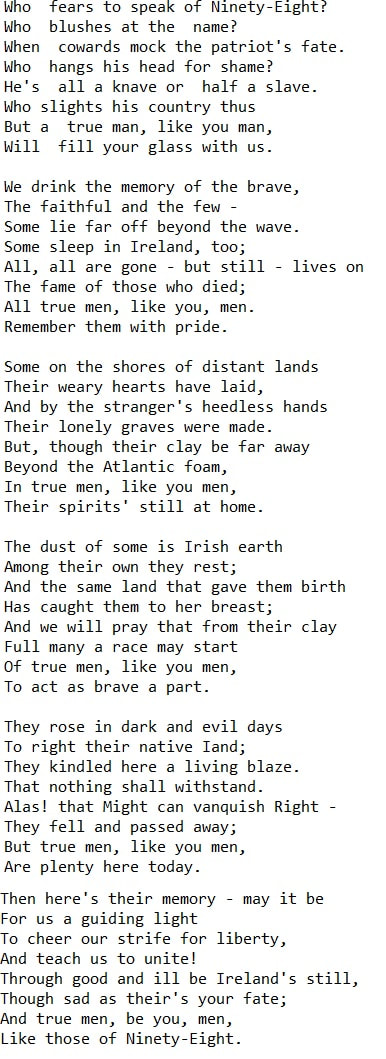In Memory Of The Dead Song Lyrics And Chords
Sometimes called ''Who Fears To Speak Of 98'' written by John Kells Ingram, This song uses the same tune as The Third West Cork Brigade, the Youtube video is of Declan Hunt.
Who [G] fears to speak of Ninety-Eight?
Who [C] blushes at the [G] name?
When [C] cowards mock the patriot's fate.
Who [D] hangs his head for shame?
He's [G] all a knave or [C] half a slave.
Who slights his country thus
But a [G] true man, like you man,
Will [C] fill your glass with [G] us.
We drink the memory of the brave,
The faithful and the few -
Some lie far off beyond the wave.
Some sleep in Ireland, too;
All, all are gone - but still - lives on
The fame of those who died;
All true men, like you, men.
Remember them with pride.
Some on the shores of distant lands
Their weary hearts have laid,
And by the stranger's heedless hands
Their lonely graves were made.
But, though their clay be far away
Beyond the Atlantic foam,
In true men, like you men,
Their spirits' still at home.
The dust of some is Irish earth
Among their own they rest;
And the same land that gave them birth
Has caught them to her breast;
And we will pray that from their clay
Full many a race may start
Of true men, like you men,
To act as brave a part.
They rose in dark and evil days
To right their native Iand;
They kindled here a living blaze.
That nothing shall withstand.
Alas! that Might can vanquish Right -
They fell and passed away;
But true men, like you men,
Are plenty here today.
Then here's their memory - may it be
For us a guiding light
To cheer our strife for liberty,
And teach us to unite!
Through good and ill be Ireland's still,
Though sad as their's your fate;
And true men, be you, men,
Like those of Ninety-Eight.
Lyrics And Chords K - M
Who [C] blushes at the [G] name?
When [C] cowards mock the patriot's fate.
Who [D] hangs his head for shame?
He's [G] all a knave or [C] half a slave.
Who slights his country thus
But a [G] true man, like you man,
Will [C] fill your glass with [G] us.
We drink the memory of the brave,
The faithful and the few -
Some lie far off beyond the wave.
Some sleep in Ireland, too;
All, all are gone - but still - lives on
The fame of those who died;
All true men, like you, men.
Remember them with pride.
Some on the shores of distant lands
Their weary hearts have laid,
And by the stranger's heedless hands
Their lonely graves were made.
But, though their clay be far away
Beyond the Atlantic foam,
In true men, like you men,
Their spirits' still at home.
The dust of some is Irish earth
Among their own they rest;
And the same land that gave them birth
Has caught them to her breast;
And we will pray that from their clay
Full many a race may start
Of true men, like you men,
To act as brave a part.
They rose in dark and evil days
To right their native Iand;
They kindled here a living blaze.
That nothing shall withstand.
Alas! that Might can vanquish Right -
They fell and passed away;
But true men, like you men,
Are plenty here today.
Then here's their memory - may it be
For us a guiding light
To cheer our strife for liberty,
And teach us to unite!
Through good and ill be Ireland's still,
Though sad as their's your fate;
And true men, be you, men,
Like those of Ninety-Eight.
Lyrics And Chords K - M
Here are the chords in the key of D
Who [D] fears to speak of Ninety-Eight?
Who [G] blushes at the [D] name?
When [G] cowards mock the patriot's fate.
Who [A] hangs his head for shame?
He's [D] all a knave or [G] half a slave.
Who slights his country thus
But a [D] true man, like you man,
Will [G] fill your glass with [D] us.
Who [D] fears to speak of Ninety-Eight?
Who [G] blushes at the [D] name?
When [G] cowards mock the patriot's fate.
Who [A] hangs his head for shame?
He's [D] all a knave or [G] half a slave.
Who slights his country thus
But a [D] true man, like you man,
Will [G] fill your glass with [D] us.

